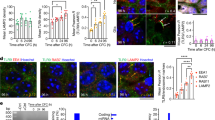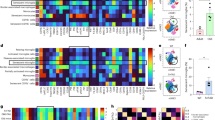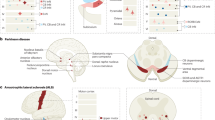Abstract
Depression constitutes a widespread condition observed in elderly patients. Recently, it was found that several drugs employed in therapies against depression stimulate hippocampal neurogenesis in young rodents and nonhuman primates. As the rate of neurogenesis is dramatically reduced during ageing, we examined the influences of ageing on neurogenic actions of antidepressants. We tested the impact of fluoxetine, a broadly used antidepressant, on hippocampal neurogenesis in mice of three different age groups (100, 200 and over 400 days of age). Proliferation and survival rate of newly generated cells, as well as the percentage of cells that acquired a neuronal phenotype were analyzed in the hippocampus of mice that received fluoxetine daily in a chronic manner. Surprisingly, the action of fluoxetine on neurogenesis was decreasing as a function of age and was only significant in young animals. Hence, fluoxetine increased survival and the frequency of neuronal marker expression in newly generated cells of the hippocampus in the young adult group (that is 100 days of age) only. No significant effects on neurogenesis could be detected in fluoxetine-treated adult and elderly mice (200 and over 400 days of age). The data indicate that the action of fluoxetine on neurogenesis is highly dependent on the age of the treated individual. Although the function of neurogenesis in the clinical manifestation of depression is currently a matter of speculation, this study clearly shows that the therapeutic effects of antidepressants in elderly patients are not mediated by neurogenesis modulation.
This is a preview of subscription content, access via your institution
Access options
Subscribe to this journal
Receive 12 print issues and online access
$259.00 per year
only $21.58 per issue
Buy this article
- Purchase on Springer Link
- Instant access to full article PDF
Prices may be subject to local taxes which are calculated during checkout



Similar content being viewed by others
References
Kuhn HG, Dickinson-Anson H, Gage FH . Neurogenesis in the dentate gyrus of the adult rat: age-related decrease of neuronal progenitor proliferation. J Neurosci 1996; 16: 2027–2033.
Bondolfi L, Ermini F, Long JM, Ingram DK, Jucker M . Impact of age and caloric restriction on neurogenesis in the dentate gyrus of C57BL/6 mice. Neurobiol Aging 2004; 25: 333–340.
Rao MS, Hattiangady B, Shetty AK . The window and mechanisms of major age-related decline in the production of new neurons within the dentate gyrus of the hippocampus. Aging Cell 2006; 5: 545–558.
Heine VM, Maslam S, Joels M, Lucassen PJ . Prominent decline of newborn cell proliferation, differentiation, and apoptosis in the aging dentate gyrus, in absence of an age-related hypothalamus-pituitary-adrenal axis activation. Neurobiol Aging 2004; 25: 361–375.
Brown JP, Couillard-Despres S, Cooper-Kuhn CM, Winkler J, Aigner L, Kuhn HG . Transient expression of doublecortin during adult neurogenesis. J Comp Neurol 2003; 467: 1–10.
Couillard-Despres S, Finkl R, Winner B, Ploetz S, Wiedermann D, Aigner R et al. In vivo optical imaging of neurogenesis—watching new neurons in the intact brain. Mol Imaging 2008; 7: 28–34.
Manganas LN, Zhang X, Li Y, Hazel RD, Smith SD, Wagshul ME et al. Magnetic resonance spectroscopy identifies neural progenitor cells in the live human brain. Science 2007; 318: 980–985.
Leuner B, Kozorovitskiy Y, Gross CG, Gould E . Diminished adult neurogenesis in the marmoset brain precedes old age. Proc Natl Acad Sci USA 2007; 104: 17169–17173.
Couillard-Despres S, Winner B, Karl C, Lindemann G, Schmid P, Aigner R et al. Targeted transgene expression in neuronal precursors: watching young neurons in the old brain. Eur J Neurosci 2006; 24: 1535–1545.
Rowe WB, Blalock EM, Chen KC, Kadish I, Wang D, Barrett JE et al. Hippocampal expression analyses reveal selective association of immediate-early, neuroenergetic, and myelinogenic pathways with cognitive impairment in aged rats. J Neurosci 2007; 27: 3098–3110.
Drapeau E, Nora Abrous D . Role of neurogenesis in age-related memory disorders. Aging Cell 2008; 7: 569–589.
Karel MJ . Aging and depression: vulnerability and stress across adulthood. Clin Psychol Rev 1997; 17: 847–879.
Stordal E, Mykletun A, Dahl AA . The association between age and depression in the general population: a multivariate examination. Acta Psychiatr Scand 2003; 107: 132–141.
Sheline YI, Sanghavi M, Mintun MA, Gado MH . Depression duration but not age predicts hippocampal volume loss in medically healthy women with recurrent major depression. J Neurosci 1999; 19: 5034–5043.
Shah PJ, Ebmeier KP, Glabus MF, Goodwin GM . Cortical grey matter reductions associated with treatment-resistant chronic unipolar depression. Controlled magnetic resonance imaging study. Br J Psychiatry 1998; 172: 527–532.
Videbech P, Ravnkilde B . Hippocampal volume and depression: a meta-analysis of MRI studies. Am J Psychiatry 2004; 161: 1957–1966.
Sheline YI, Gado MH, Kraemer HC . Untreated depression and hippocampal volume loss. Am J Psychiatry 2003; 160: 1516–1518.
Gould E, McEwen BS, Tanapat P, Galea LAM . Neurogenesis in the dentate gyrus of the adult tree shrew is regulated by psychosocial stress and NMDA receptor activation. J Neurosci 1997; 17: 2492–2498.
Czeh B, Welt T, Fischer AK, Erhardt A, Schmitt W, Muller MB et al. Chronic psychosocial stress and concomitant repetitive transcranial magnetic stimulation: effects on stress hormone levels and adult hippocampal neurogenesis. Biol Psychiatry 2002; 52: 1057–1065.
Mirescu C, Gould E . Stress and adult neurogenesis. Hippocampus 2006; 16: 233–238.
Gould E, Cameron HA, Daniels DC, Woolley CS, McEwen BS . Adrenal hormones suppress cell division in the adult rat dentate gyrus. J Neurosci 1992; 12: 3642–3650.
Cameron HA, Gould E . Adult neurogenesis is regulated by adrenal steroids in the dentate gyrus. Neuroscience 1994; 61: 203–209.
Cameron HA, McKay RD . Restoring production of hippocampal neurons in old age. Nat Neurosci 1999; 2: 894–897.
Tanapat P, Galea LA, Gould E . Stress inhibits the proliferation of granule cell precursors in the developing dentate gyrus. Int J Dev Neurosci 1998; 16: 235–239.
Manev H, Uz T, Smalheiser NR, Manev R . Antidepressants alter cell proliferation in the adult brain in vivo and in neural cultures in vitro. Eur J Pharmacol 2001; 411: 67–70.
Malberg JE, Eisch AJ, Nestler EJ, Duman RS . Chronic antidepressant treatment increases neurogenesis in adult rat hippocampus. J Neurosci 2000; 20: 9104–9110.
Encinas JM, Vaahtokari A, Enikolopov G . Fluoxetine targets early progenitor cells in the adult brain. Proc Natl Acad Sci USA 2006; 103: 8233–8238.
Sairanen M, Lucas G, Ernfors P, Castren M, Castren E . Brain-derived neurotrophic factor and antidepressant drugs have different but coordinated effects on neuronal turnover, proliferation, and survival in the adult dentate gyrus. J Neurosci 2005; 25: 1089–1094.
Santarelli L, Saxe M, Gross C, Surget A, Battaglia F, Dulawa S et al. Requirement of hippocampal neurogenesis for the behavioral effects of antidepressants. Science 2003; 301: 805–809.
Wong ML, Licinio J . From monoamines to genomic targets: a paradigm shift for drug discovery in depression. Nat Rev Drug Discov 2004; 3: 136–151.
Flurkey K, Currer JM, Harisson DE . Mouse models in aging research. In: Fox JG, Barthold SW, Davisson MT, Newcomer CE, Quimby FW, Smith AL (eds). The Mouse in Biomedical Research, 2nd edn, vol. 3 Academic Press: Amsterdam, 2007, pp 637–672.
Holladay JW, Dewey MJ, Yoo SD . Quantification of fluoxetine and norfluoxetine serum levels by reversed-phase high-performance liquid chromatography with ultraviolet detection. J Chromatogr B Biomed Sci Appl 1997; 704: 259–263.
Ferguson JM, Hill H . Pharmacokinetics of fluoxetine in elderly men and women. Gerontology 2006; 52: 45–50.
Couillard-Despres S, Winner B, Schaubeck S, Aigner R, Vroemen M, Weidner N et al. Doublecortin expression levels in adult brain reflect neurogenesis. Eur J Neurosci 2005; 21: 1–14.
Cooper-Kuhn CM, Kuhn HG . Is it all DNA repair? Methodological considerations for detecting neurogenesis in the adult brain. Brain Res Dev Brain Res 2002; 134: 13–21.
Malberg JE, Duman RS . Cell proliferation in adult hippocampus is decreased by inescapable stress: reversal by fluoxetine treatment. Neuropsychopharmacology 2003; 28: 1562–1571.
Marcussen AB, Flagstad P, Kristjansen PE, Johansen FF, Englund U . Increase in neurogenesis and behavioural benefit after chronic fluoxetine treatment in Wistar rats. Acta Neurol Scand 2008; 117: 94–100.
Surget A, Saxe M, Leman S, Ibarguen-Vargas Y, Chalon S, Griebel G et al. Drug-dependent requirement of hippocampal neurogenesis in a model of depression and of antidepressant reversal. Biol Psychiatry 2008; 64: 293–301.
Holick KA, Lee DC, Hen R, Dulawa SC . Behavioral effects of chronic fluoxetine in BALB/cJ mice do not require adult hippocampal neurogenesis or the serotonin 1A receptor. Neuropsychopharmacology 2008; 33: 406–417.
Huang GJ, Bannerman D, Flint J . Chronic fluoxetine treatment alters behavior, but not adult hippocampal neurogenesis, in BALB/cJ mice. Mol Psychiatry 2008; 13: 119–121.
Cowen DS, Takase LF, Fornal CA, Jacobs BL . Age-dependent decline in hippocampal neurogenesis is not altered by chronic treatment with fluoxetine. Brain Res 2008; 1228: 14–19.
Chen SJ, Kao CL, Chang YL, Yen CJ, Shui JW, Chien CS et al. Antidepressant administration modulates neural stem cell survival and serotoninergic differentiation through bcl-2. Curr Neurovasc Res 2007; 4: 19–29.
Perera TD, Coplan JD, Lisanby SH, Lipira CM, Arif M, Carpio C et al. Antidepressant-induced neurogenesis in the hippocampus of adult nonhuman primates. J Neurosci 2007; 27: 4894–4901.
Kuhn HG, Biebl M, Wilhelm D, Li M, Friedlander RM, Winkler J . Increased generation of granule cells in adult Bcl-2-overexpressing mice: a role for cell death during continued hippocampal neurogenesis. Eur J Neurosci 2005; 22: 1907–1915.
Huang GJ, Herbert J . Stimulation of neurogenesis in the hippocampus of the adult rat by fluoxetine requires rhythmic change in corticosterone. Biol Psychiatry 2006; 59: 619–624.
Alexopoulos GS, Katz IR, Reynolds III CF, Carpenter D, Docherty JP, Ross RW . Pharmacotherapy of depression in older patients: a summary of the expert consensus guidelines. J Psychiatr Pract 2001; 7: 361–376.
Arivazhagan P, Panneerselvam C . Neurochemical changes related to ageing in the rat brain and the effect of DL-alpha-lipoic acid. Exp Gerontol 2002; 37: 1489–1494.
Marcusson JO, Morgan DG, Winblad B, Finch CE . Serotonin-2 binding sites in human frontal cortex and hippocampus. Selective loss of S-2A sites with age. Brain Res 1984; 311: 51–56.
Sibille E, Su J, Leman S, Le Guisquet AM, Ibarguen-Vargas Y, Joeyen-Waldorf J et al. Lack of serotonin1B receptor expression leads to age-related motor dysfunction, early onset of brain molecular aging and reduced longevity. Mol Psychiatry 2007; 12: 1042–1056, 1975.
Hattiangady B, Rao MS, Shetty GA, Shetty AK . Brain-derived neurotrophic factor, phosphorylated cyclic AMP response element binding protein and neuropeptide Y decline as early as middle age in the dentate gyrus and CA1 and CA3 subfields of the hippocampus. Exp Neurol 2005; 195: 353–371.
Nibuya M, Nestler EJ, Duman RS . Chronic antidepressant administration increases the expression of cAMP response element binding protein (CREB) in rat hippocampus. J Neurosci 1996; 16: 2365–2372.
Larsen MH, Hay-Schmidt A, Ronn LC, Mikkelsen JD . Temporal expression of brain-derived neurotrophic factor (BDNF) mRNA in the rat hippocampus after treatment with selective and mixed monoaminergic antidepressants. Eur J Pharmacol 2008; 578: 114–122.
Balu DT, Hoshaw BA, Malberg JE, Rosenzweig-Lipson S, Schechter LE, Lucki I . Differential regulation of central BDNF protein levels by antidepressant and non-antidepressant drug treatments. Brain Res 2008; 1211: 37–43.
Meaney MJ, Aitken DH, Sharma S, Viau V . Basal ACTH, corticosterone and corticosterone-binding globulin levels over the diurnal cycle, and age-related changes in hippocampal type I and type II corticosteroid receptor binding capacity in young and aged, handled and nonhandled rats. Neuroendocrinology 1992; 55: 204–213.
Ambrogini P, Orsini L, Mancini C, Ferri P, Barbanti I, Cuppini R . Persistently high corticosterone levels but not normal circadian fluctuations of the hormone affect cell proliferation in the adult rat dentate gyrus. Neuroendocrinology 2002; 76: 366–372.
Montaron MF, Petry KG, Rodriguez JJ, Marinelli M, Aurousseau C, Rougon G et al. Adrenalectomy increases neurogenesis but not PSA-NCAM expression in aged dentate gyrus. Eur J Neurosci 1999; 11: 1479–1485.
Buckwalter MS, Yamane M, Coleman BS, Ormerod BK, Chin JT, Palmer T et al. Chronically increased transforming growth factor-beta1 strongly inhibits hippocampal neurogenesis in aged mice. Am J Pathol 2006; 169: 154–164.
Wachs FP, Winner B, Couillard-Despres S, Schiller T, Aigner R, Winkler J et al. Transforming growth factor-beta1 is a negative modulator of adult neurogenesis. J Neuropathol Exp Neurol 2006; 65: 358–370.
Bye N, Zieba M, Wreford NG, Nichols NR . Resistance of the dentate gyrus to induced apoptosis during ageing is associated with increases in transforming growth factor-beta1 messenger RNA. Neuroscience 2001; 105: 853–862.
Nichols NR . Glial responses to steroids as markers of brain aging. J Neurobiol 1999; 40: 585–601.
Acknowledgements
This study was supported by the Bavarian State Ministry of Sciences, Research and Arts (ForNeuroCell grant), the German Federal Ministry of Education and Research BMBF grants 01GN0507 and 01GG0706.
Author information
Authors and Affiliations
Corresponding author
Rights and permissions
About this article
Cite this article
Couillard-Despres, S., Wuertinger, C., Kandasamy, M. et al. Ageing abolishes the effects of fluoxetine on neurogenesis. Mol Psychiatry 14, 856–864 (2009). https://doi.org/10.1038/mp.2008.147
Received:
Revised:
Accepted:
Published:
Issue Date:
DOI: https://doi.org/10.1038/mp.2008.147
Keywords
This article is cited by
-
Identification and functional characterization of CD133+GFAP+CD117+Sca1+ neural stem cells
Molecular and Cellular Biochemistry (2022)
-
Novel pharmacotherapy: NNI-362, an allosteric p70S6 kinase stimulator, reverses cognitive and neural regenerative deficits in models of aging and disease
Stem Cell Research & Therapy (2021)
-
Hippocampal bone morphogenetic protein signaling mediates behavioral effects of antidepressant treatment
Molecular Psychiatry (2017)
-
Modelling depression in animals: at the interface of reward and stress pathways
Psychopharmacology (2017)
-
Dental noise exposed mice display depressive-like phenotypes
Molecular Brain (2016)



